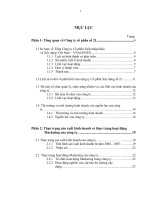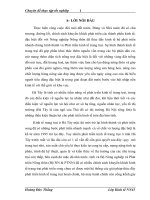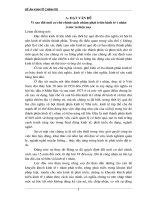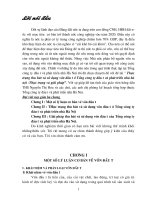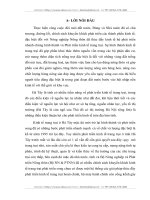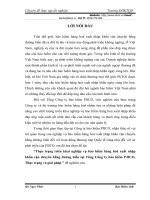Thực trạng và giải pháp về năng lực, phương pháp giảng dạy của giảng viên tiếng Anh và hiệu quả tiếp thu của sinh viên năm thứ nhất tại Đại học Thái Nguyên
Bạn đang xem bản rút gọn của tài liệu. Xem và tải ngay bản đầy đủ của tài liệu tại đây (8.8 MB, 208 trang )
i
THAI NGUYEN UNIVERSITY
Socialist Republic of Vietnam
BATANGAS STATE UNIVERSITY
Republic of the Philippines
THE COMPETENCIES AND PERFORMANCE OF ENGLISH TEACHERS
AND FIRST YEAR STUDENTS ACHIEVEMENT AND ATTITUDE: BASIS
FOR A PROPOSED INSTRUCTIONAL PLAN
A Dissertation Presented to
The Faculty of Graduate School
Batangas State University
Batangas City, Philippines
In partial Fulfillment of the
Requirements for the Degree of
Doctor of Philosophy
Major in English
By
Nguyen Thi Dieu Ha (Bella)
May, 2015
i
THAI NGUYEN UNIVERSITY
Socialist Republic of Vietnam
BATANGAS STATE UNIVERSITY
Republic of the Philippines
TABLE OF CONTENTS
Page
TABLE OF CONTENTS ............................................................................... i
LIST OF TABLES ...................................................................................... iii
LIST OF FIGURES ...................................................................................... v
CHAPTER
I. THE PROBLEM ........................................................................................................1
Introduction ...................................................................... 1
Scope, limitation and delimitation of the study ............... 10
Significance of the study ................................................ 11
II. REVIEW OF RELATED LITERATURE AND STUDIES ..................................... 13
Conceptual literature ...................................................... 13
English language Instruction .......................................... 13
English Language Instruction ........................................ 35
Related Studies.............................................................. 75
Theoretical Framework ................................................ 102
Conceptual Framework ................................................ 107
Hypothesis of the study ............................................... 109
Definition of Terms ....................................................... 109
ii
THAI NGUYEN UNIVERSITY
Socialist Republic of Vietnam
BATANGAS STATE UNIVERSITY
Republic of the Philippines
III. METHODOLOGY .............................................................................................. 111
Research Design ......................................................... 111
Subject of the study ..................................................... 112
Data gathering instrument ........................................... 113
Data gathering procedure ............................................ 113
Statistical treatment of data ......................................... 114
IV. PRESENTATION, ANALYSIS AND INTERPRETATION OF DATA .............. 115
V. SUMMARY, CONCLUSIONS AND RECOMMENDATIONS ............................ 160
Summary...................................................................... 160
Findings ....................................................................... 162
Conclusions ................................................................. 167
Recommendations ....................................................... 169
BIBLIOGRAPHY ....................................................................................................... 170
APPENDIX ................................................................................................................ 176
CURRICULUM VITAE .............................................................................................. 191
iii
THAI NGUYEN UNIVERSITY
Socialist Republic of Vietnam
BATANGAS STATE UNIVERSITY
Republic of the Philippines
LIST OF TABLES
Table
Title
Page
1.Distribution of samples by Colleges ............................................................ 112
2.1. Competencies of English Faculty of TNU in terms of Subject Matter
Expertise ................................................................................................... 119
2.2. Competencies of English Faculty of TNU in terms of Classroom
Management Expertise ............................................................................ 123
2.3. Competencies of English Faculty of TNU in terms of Instructional
Expertise .................................................................................................. 127
2.4. Competencies of English Faculty of TNU in terms of
Communication Expertise...................................................................... 130
2.5 Competencies of English Faculty of TNU in terms of Diagnostic Expertise .... 133
2.6. Competencies of English Faculty of TNU in terms of Relational Expertise .... 137
3. Difference of Responses on Teachers’ Performance and Level of
Competence ............................................................................................... 140
4. Students’ Level of Performance in Basic English...................................... 143
iv
THAI NGUYEN UNIVERSITY
Socialist Republic of Vietnam
BATANGAS STATE UNIVERSITY
Republic of the Philippines
5. Attitudes towards English Language.......................................................... 144
6. Relationship Between Attitude of Students and ........................................ 150
7. Level of Performance in English ................................................................ 150
8. Instructional Plan to Facilitate Teaching and Learning ............................. 152
v
THAI NGUYEN UNIVERSITY
Socialist Republic of Vietnam
BATANGAS STATE UNIVERSITY
Republic of the Philippines
LIST OF FIGURES
Figure
1.
Title
Page
Conceptual Paradigm of the study ............................................ 108
1
THAI NGUYEN UNIVERSITY
Socialist Republic of Vietnam
BATANGAS STATE UNIVERSITY
Republic of the Philippines
CHAPTER I
THE PROBLEM
Introduction
Quality education is first and foremost a function of instruction,
because in the hands of uncommitted and ineffective teachers, the bestdesigned curriculum is doomed to fail. While it is true that some students
can learn in spite of the teacher, it cannot be denied that the quality of the
outputs of education is a function, to a great extent, of instruction and
students’ interaction with the teachers.
Teachers who are masters of their craft and are genuinely
concerned with the total growth of their students can leave an indelible
imprint in the hearts and minds of the learners that can withstand the
passage of time. Teaching expertise is ordinarily attained by only a small
percentage of those who are competent in teaching (Berliner, 1992 in
Reyes, 2002).
Nothing is more central to student learning than the quality of the
teacher. He is the most important education factor influencing student
outcomes and his far reaching influence as agent of constructive change in
2
THAI NGUYEN UNIVERSITY
Socialist Republic of Vietnam
BATANGAS STATE UNIVERSITY
Republic of the Philippines
society cannot be questioned. His influence on student achievement is
inarguable. These observations stem from the findings of previous
researchers who posited that the quality of the teacher could account for a
significant amount of variance in student achievement (Hua:2010;
Goldhaber:2002; Frost Leo in Hua:2010).
Teacher competencies which deal with what the teacher does while
teaching include behaviors related to student achievement which were
referred to in a separate publication as key and catalytic behaviors.
Subsequent analysis showed two behaviors consistently related with
student achievement namely task orientation or direct instruction, and
opportunity to learn oftentimes referred to as academic time, engaged time
or content covered.
It was also found that to increase student achievement scores, a
teacher should use strong classroom management, possess high
expectations for students, and maintain an optimal level of learning
difficulty. Teachers who were accepting, attentive, aware of developmental
needs, consistent in controlling classes, democratic, encouraging, tolerant
of race and class, flexible, and optimistic were also found to be successful.
There were other models developed both by foreign and local researchers
3
THAI NGUYEN UNIVERSITY
Socialist Republic of Vietnam
BATANGAS STATE UNIVERSITY
Republic of the Philippines
who identified teacher behaviors that correlate strongly with student
outcomes.
It is evident that teachers have the greatest potential to influence
students’ education, and that student achievement is related to teacher
competence in teaching. There is sufficient evidence that shows that
students achieve more when teachers employ systematic teaching
procedures and systematic feedback on students’ performance and that
achievement is higher in classrooms where the climate is warm and
democratic, neither harsh nor overly lavish with praise and that teachers
who adjust the difficulty level of material to student ability have higher rates
of achievement in their classes (Kemp & Hall, 1992 in Goldhaber, 2003).
These studies confirm that teachers have a greater impact on students
than any other schooling factor and that there is no substitute for a highly
skilled teacher.
No one can deny the fact that the role of the teacher is crucial in
establishing a culture of learning. There have been so many factors
considered in making a teacher effective and efficient in this complex
endeavor. One of the most important and complex issue in education is on
teacher evaluation and professional growth since no answer yet has been
4
THAI NGUYEN UNIVERSITY
Socialist Republic of Vietnam
BATANGAS STATE UNIVERSITY
Republic of the Philippines
given as to the best ways to meet the growth needs of the teachers. It is
also a sad fact that many intellectual, emotional, spiritual and physical
demands are placed on teachers as they seek appropriate resources,
teaching methods, and assessment techniques to make learning
meaningful for each student. For most teachers, the job becomes
emotionally draining especially if done with intensity, passion and love.
Generally, all teachers pass in sequence from pre-service stage into
the induction stage of their careers. Those that remain in the profession,
stand to branch off into one of the several stages beyond the induction.
These include (a) the competency-building stage, (b) the enthusiastic and
growing stage, (c) the stable and stagnant stage, (d) the career-frustration
stage, and (e) the career wind-down stage.
With this reality, the development of the teacher as a professional
becomes the key to a successful learning culture within a school. Since
quality teaching demands a continuous monitoring of performance and a
commitment to view professional development as a career-long enterprise,
preparation
for
teaching
also
becomes
a
career
long
process.
Undoubtedly, part of this process is the continuous professional growth
teachers are expected to commit themselves so that they may become
5
THAI NGUYEN UNIVERSITY
Socialist Republic of Vietnam
BATANGAS STATE UNIVERSITY
Republic of the Philippines
open to new information and approaches as they monitor changes in their
personal and professional environments.
From the early 1900s to the late ‘50s, research on teaching focused
on teacher effectiveness. Traits and attributes most and least preferred of
teachers by students, teacher educators and school administrators were
identified.
Attributes
of
most-liked
teachers
included
enthusiasm,
adaptability, good judgment, magnetism, fairness, kindness and love,
ability to teach and counsel, consideration, open-mindedness, consistency,
sense of humor, pleasing personality and good grooming. The least liked
teachers were perceived as unfair, aloof, arrogant, bossy, irritable, cranky,
and boring. They reportedly had no sense of humor, insulted students and
did not allow for freedom of expression. (Reyes, 2002)
However, in the ‘60s and ‘70s, researchers realized that studies on
teaching effectiveness could not be confined to the narrow dimension of
teacher traits or attributes. This dimension did not consider teaching
practices, and gave the impression that teachers are born. Consequently,
researchers’ attention that shifted to the identification of classroom
teaching practices that differentiated effective from ineffective teachers.
Researchers sat in classes a couple of times during the school year then
6
THAI NGUYEN UNIVERSITY
Socialist Republic of Vietnam
BATANGAS STATE UNIVERSITY
Republic of the Philippines
documented, with the use of observation instruments, how teachers
conducted classroom instruction. The frequencies of occurrences of
teaching practices - such as observing wait-time in questioning, giving
feedback, using praise, keeping students on task and using varied
teaching methodologies- were averaged across observations
and
correlated with teaching outcomes, usually measured by students’ scores
in standardized tests. These efforts characterized the so-called “processproduct” studies, which established the conclusion that differences in
learning may be attributed to differences in teachers’ technical skills and
teaching practices. Teachers who are flexible in implementing different
teaching methodologies were described as more effective than those who
were rigid or who employed one teaching method long after its particular
contribution that had been utilized effectively. The former were referred to
as cognitive flexible teachers: teaching approach was needed. Students’
active engagement in to the growing list of effective teaching practices
(Rosenshine & Berliner, 1978; Shulman, 1986 in Reyes, 2002). Compared
with their less effective peers, the more effective teachers were described
as being more organized in teaching, spending more time in active
instruction and student-teacher discourse, and placing more emphasis on
7
THAI NGUYEN UNIVERSITY
Socialist Republic of Vietnam
BATANGAS STATE UNIVERSITY
Republic of the Philippines
mastery learning. They had greater rapport with students, paid more
attention to students’ individual differences, taught with greater enthusiasm
and demonstrated better communication and motivation skills.
Salomon supported that the need for students’ active involvement in
learning is based on his descriptions of responsible teaching. For him
(Salomon), responsible teaching involves the proper carrying out of the
role of the teacher as an orchestrator catering to different students
(Salomon, 1992 in Reyes, 2002). It entails assuming responsibility for the
learning process and outcomes, while at the same time judiciously shifting
this responsibility to students. Salomon further views responsible teaching
as the serious consideration, selection and design (as contrasted with
mindless adoption) of instructional means, activities, tasks, and the like in
the light of normative and moral criteria.
For Shulman (in Reyes, 2002), the professional knowledge of expert
teachers goes beyond subject matter mastery. These teachers know
varied generic teaching strategies applicable across disciplines. They are
familiar with the curriculum materials appropriate for the subjects they
handle, as well as with the special techniques suited to particular groups of
learners and lessons. They are aware of different settings for learning, and
8
THAI NGUYEN UNIVERSITY
Socialist Republic of Vietnam
BATANGAS STATE UNIVERSITY
Republic of the Philippines
are fully acquainted with goals and objectives of teaching. Expert teaches
have “elaborate system of knowledge”. Precisely, the quality of this
knowledge differentiates them from their colleagues, (Peterson &
Comeaux, 1989 in Reyes, 2002). In addition, their vast depository of
knowledge is so well-organized that they can make adaptations for any
given classroom situation or need (Galton, 1989 in Reyes, 2002).
Shulman asserts that “teaching is and has always been at the center
of all education and educational reform”. Thus, any research that focuses
on teaching is significant, especially if it provides an empirical base that
can guide policy action on teachers and teaching (Reyes, 2002).
It is in this light that this study will be undertaken. The main concern
of the study is to determine if the teaching competencies of teachers
evidenced through their teaching performance have any significant
relationship with the students’ achievement. The study is limited to the
teachers at Thai Nguyen University teaching General education courses.
Student achievement is limited to the final average obtained by the student
in the subjects wherein he is enrolled during the school year 2013 – 2014.
This study is deemed beneficial to the school managers who
through the findings will gain a better understanding of the importance of
9
BATANGAS STATE UNIVERSITY
Republic of the Philippines
THAI NGUYEN UNIVERSITY
Socialist Republic of Vietnam
the evaluation of teachers’ performance and thus guide them in formulating
policies and programs that will respond to the teachers’ needs and
contribute
to
the
teachers’
teaching
effectiveness.
The
teachers
themselves will be motivated to demonstrate the desired competencies
that contribute to successful teaching; thus, they will produce better
outputs in terms of academic achievement which in turn may qualify them
for recognition by the school management. The study will also add to the
present knowledge on the areas of teaching performance and teaching
effectiveness and inspire other researchers to conduct further studies on
teaching performance and student achievement using other correlates
such as board examination results.
Statement of the problem
As a teacher at the English Department, School of Foreign
Languages - Thai Nguyen University, the researcher realized the fact that
students have a lot of problems concerning their English language
learning. It is true that they have twelve periods of English a week and
teachers are alert to help them with their problems.
This research is designed to improve the students’ achievement in English
specifically it will seek to answer the following questions:
10
THAI NGUYEN UNIVERSITY
Socialist Republic of Vietnam
BATANGAS STATE UNIVERSITY
Republic of the Philippines
1. What is the level of teachers’ instructional performance in terms of:
1.1 subject matter expertise
1.2 classroom management expertise
1.3 instructional expertise
1.4 communication expertise
1.5 diagnostic expertise and
1.6 relational expertise
2. What is the level of student achievement in terms of their final grades in
their English subjects?
3. Is there a significant relationship between the teachers’ instructional
performance and the students’ achievement in English?
4. Which of the teachers’ competencies is the best predictor of students’
achievement in English?
5. What measures can be proposed to enhance the teachers’ teaching
effectiveness?
Scope, Delimitation and Lmitation of the study
This study will attempt to determine if a significant relationship exists
between the teachers’ instructional performance and the students’
academic achievement. Specifically it will seek to describe the level of
11
THAI NGUYEN UNIVERSITY
Socialist Republic of Vietnam
BATANGAS STATE UNIVERSITY
Republic of the Philippines
teachers’ instructional performance in terms of the following competencies:
subject matter expertise, classroom management expertise, instructional
expertise, communication expertise, diagnostic expertise and relational
expertise.
It will also seek to describe the level of the student achievement in
terms of their final averages in the general education and professional
subjects and determine if a significant relationship exists between the
teachers’
instructional
performance
and
the
students’
academic
achievement.
Finally, the study will identify which of the teachers’ competencies
appears to be the best predictor of student achievement. Based on the
findings of the study, the researcher will propose measures to enhance the
teachers’ teaching effectiveness
Subject research participants of the study
This study is deemed significant to the following:
To the subject research participants, TNU teachers of Foreign
Languages, for they can have the chance to evaluate their own
12
THAI NGUYEN UNIVERSITY
Socialist Republic of Vietnam
BATANGAS STATE UNIVERSITY
Republic of the Philippines
performance based on the identified domains and likewise realizes their
own strengths and weaknesses.
To the school administrators, the findings of this investigation can
serve as basis in coming up with plans to institutionalize some
standardized self-evaluation instrument that will address the specific needs
of the teaching force.
To the Human Resource and Management Department, the result of
this study can serve as guide in their future plans to modify some existing
teacher’s assessment instrument and likewise come up with a more
appropriate and relevant training programs for teachers.
To the curriculum planners, for they can solicit the assistance of the
subject research participants to provide inputs for any proposed curriculum
development since they are the ones directly involved in implementing any
future curricular program of the school.
And lastly, to the students of Thai Nguyen University, who are direct
stakeholders of education, since any improvement in the teachers’
proficiency can likewise enhance the students’ achievement.
13
THAI NGUYEN UNIVERSITY
Socialist Republic of Vietnam
BATANGAS STATE UNIVERSITY
Republic of the Philippines
CHAPTER II
REVIEW OF RELATED LITERATURE AND STUDIES
This chapter presents the relevant literature, studies and concepts
which are essential in the development of conceptual framework in
providing directions for the study.
Conceptual literature
English language Instruction
It has been said that teaching is the noblest and the most important
profession in the world. Teaching is especially important to the nation
because teaching is building the builders of the nation. No one can claim
that he has no passed through the hands of a teacher or teachers.
Teaching is a big business, only a small part goes to lecturing or
directing students. Giving assignments to students, supplying them with
instructional materials and other reference materials, administrating tests
and scoring them to solve mathematical problems, or to write themes or
compositions and countless other activities are all parts of teaching.
14
THAI NGUYEN UNIVERSITY
Socialist Republic of Vietnam
BATANGAS STATE UNIVERSITY
Republic of the Philippines
Thus, a teacher has to be expert in his craft in order to provide rich
learning materials and activities to make the students learn and absorb
knowledge and other aspects of learning in greater quantity and quality. It
is imperative then that the kind of citizens that the country will have
tomorrow depends much on the kind of teachers we have today.
What factors make one a good teacher? First, he must be fully
qualified educationally and he must have professional qualifications,
instructional competencies, skills and professional characteristics to be a
good teacher. A good teacher must have (1) mastery of the subject matter;
(2) mastery of the methods, strategies, approaches and techniques of
teaching; (3) mastery of the medium of instruction; (4) mastery of lesson
planning and organizing instructional materials; (5) knowledge of
psychology of learning; (7) skills of classroom management including
discipline; (8) mastery of measurement and evaluation; (10) mastery of the
art of questioning; and (11) mastery of the basics of guidance and
counseling (Calderon:1998)
This list of instructional competencies of a good teacher is but one
aspects of good teaching. Another aspect that is worth mentioning is the
personal characteristics such as intelligence, punctuality and enthusiasm,
15
THAI NGUYEN UNIVERSITY
Socialist Republic of Vietnam
BATANGAS STATE UNIVERSITY
Republic of the Philippines
good physical and mental health, loyalty and commitment, respect for the
dignity of the individual, fair level of tolerance, firmness and impartiality,
adaptability, alertness, resourcefulness, creativity, appropriate grooming,
clean sense of humor, good professional and human relations, good moral
and ethical character, desiring to grow professionally, love for children, and
observance of the Code of Ethics.
According to Lardizabal, et al (1991), teaching is the most technical,
difficult and challenging profession. This was also the point raised by
Calderon (1998), although not specifically mentioned is the term difficult. In
the point of view of Lardizabal, a good teacher must know his tasks
because experiences of successful teachers have shown that the teachers’
job is not confined solely to the transmission of knowledge and information
because according to her some modern technological devices such as
teaching machines, television, films, and computers can already do that.
The teacher’s role in the improvement of instruction cannot be taken
for granted particularly in this era of unprecedented changes. Expansion of
knowledge in the twentieth century has been so rapid, and the rate of
obsolescence so swift that much of the knowledge acquired by teachers
during pre-service period may be quickly outmoded like “…. advancements
16
THAI NGUYEN UNIVERSITY
Socialist Republic of Vietnam
BATANGAS STATE UNIVERSITY
Republic of the Philippines
in psychology on learning, in human growth and development, in teaching
and methods, and is provisions for continuous development.”
Sauders (1990) stated that to be truly good teaching colleges, the
school must have faculty members who are good teachers. Good teachers
are those who are experts in pedagogy on how to teach, are experts in
their discipline. The excellent academic community must recognize the
dimensions of and the importance of the scholar-teacher and provide
opportunities for and encourage participation in scholarly activities, while
continuing to emphasize excellence in teaching program being essential to
quality instruction.
An instruction includes five components, namely:
Communicating Clearly and Accurately: This pertains to
teacher’s ability to (1) ensure that all policies and
procedures and regulations are well understood by every
student; (2) communicate with different kinds of people and
to use various techniques of determining whether or not
his/her message id correctly picked up; (3) get across
his/her message in both oral and written communication;
17
THAI NGUYEN UNIVERSITY
Socialist Republic of Vietnam
BATANGAS STATE UNIVERSITY
Republic of the Philippines
and (4) develop a media which best suits the level of
intended receiver of communication.
Using Questioning and Discussion Techniques: To further
enrich the learning of the students, the teacher should
provide a quality question that will stimulate the critical
thinking of the students. This component also includes the
techniques being utilized by the teacher, thus, ensuring the
active participation of the students during class discussion.
Engaging Students in Learning: Learning is an active
process that needs to be simulated and guided. It is
through this principle that makes the teacher responsible in
making most of the learning process a self-activity of the
student by: (1) providing an appropriate activities and
assignment; (2) facilitating productive instructional group;
(3) engaging students in the creation of instructional
materials; and (4) providing an appropriate pacing for the
lessons y making the lesson’s structure highly coherent
that allows reflection and appropriate closure.
18
THAI NGUYEN UNIVERSITY
Socialist Republic of Vietnam
BATANGAS STATE UNIVERSITY
Republic of the Philippines
Providing Feedback to Students: Provision is made for the
students to use feedback in their learning. This component
also includes the timeless of the feedback being given by
the teacher so that it can be used by the student in their
learning.
Demonstrating
Flexibility
and
Responsiveness:
This
pertains to the teacher’s ability to (1) adjust the lesson as
needed; (2) accommodate students’ question or interests;
(3) persist in seeking effective approaches for the students
who need help.
Instructional also refers to the clarity in asking questions. Questions
according to Armstrong should be worded in such a way that learners
clearly perceive the teacher’s content. Cazdu (1986 in Armstrong, 1989)
contends that it is better for the teacher to provide some general
background information before beginning to ask questions. Armstrong
(1989) further claims that questions should be kept relatively short and
terminology should be well within the group of the learners to whom they
are directed.
19
THAI NGUYEN UNIVERSITY
Socialist Republic of Vietnam
BATANGAS STATE UNIVERSITY
Republic of the Philippines
Questioning allows the students to practice and master the topic
taught before having to go to the next topic. Gagne Yekovick and Yekovick
(1993 in Muijs, 2001) further say that being able to correctly answer
questions also enhances a student’s feeling of mastery which will in turn
enhance the student’s self-esteem and make him more receptive to
learning in the future. It also allow students to clarify their own thinking and
understanding of the concept taught and makes them verbalize their
thinking and this helps them develop verbal skills which they will need not
only in school but also in the workplace.
Borich (1990) affirms the above criteria of clarity. He presents three
types of behavior for achieving lesson clarity at the beginning of a lesson.
These are: informing learners of the objective, providing learners with an
advance organizer and checking for task-relevant prior learning and reteaching if necessary. He lists specific behaviors that describe high level of
clarity (effective teaching) such as using advance organizers and giving
directions clearly and distinctly while poor clarity would be exemplified by
the teacher introducing the subject in broader content or lecturing from the
textbook.

